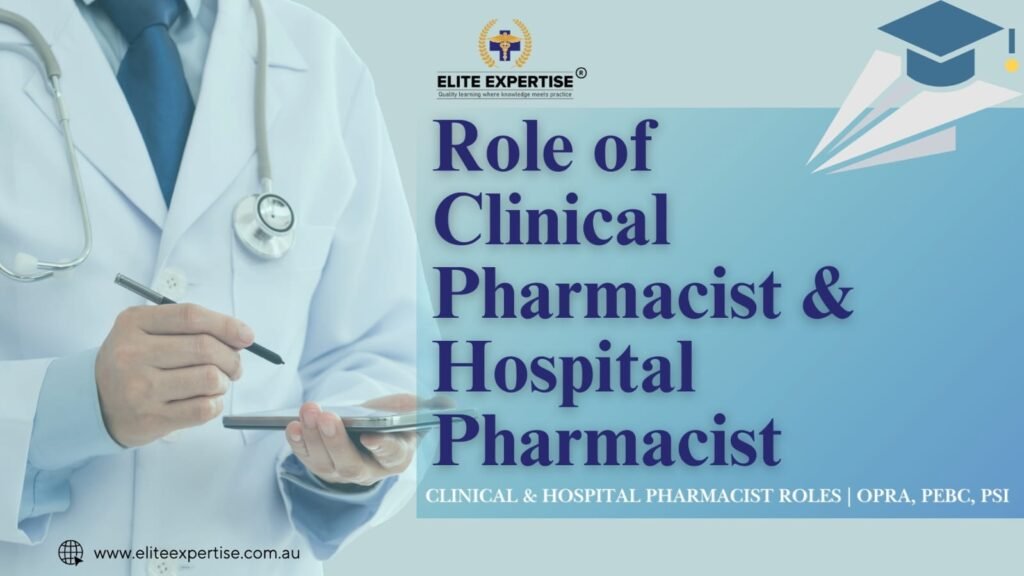Quick Recap
- The main focus of a clinical pharmacists is on patient centred care and Therapeutic Drug Monitoring.
- Also the hospital pharmacists have to manage the inpatient and outpatient medicines in the hospital.
- Salaries in Australia as a pharmacist range from AUD 65,000 to AUD 110,000+ depending on their roles and experience.
- To practice as a licensed pharmacist, you must clear the OPRA (Australia), PEBC (Canada) or PSI (Ireland) exams.
Today pharmacists are more than just medicine dispensers. They are important members of healthcare teams by ensuring effective, safe and patient centred treatments. And also the hospital pharmacists and clinical pharmacists also hold a specialised role that directly impacts their health outcomes. Clinical pharmacists primarily concentrate on medication management, patient care, and therapeutic drug monitoring as part of their duties. On the other hand, hospital pharmacists are the ones who guarantee that drugs are safely prepared and delivered in healthcare settings.
Besides this, they also collaborate with clinicians for medication management, patient care, and therapeutic drug monitoring to nursing and medical staff. If you are getting ready for OPRA, PEBC Exam or PSI tests then having a clear idea of these roles. It will undoubtedly help you to become a successful pharmacist working in a different capacity.
What Is the Role of a Clinical Pharmacist?
A clinical pharmacist works directly with physicians and patients to optimise treatment. They give expert advice about medicines manage side effects and monitor drug interactions.
Core Functions Include:
- Medication Management and Patient Care – Preventing errors, reviewing prescriptions and counselling patients.
- Therapeutic Drug Monitoring (TDM) – Measuring the drug concentration in the blood to tailor the dose for better results.
- Partnership – Engaging with medical teams to confirm the safety and efficacy of treatment plans.
Role of a Hospital Pharmacists
They play a vital role in the healthcare facilities. The hospital pharmacists have to ensure management of medicine, correct preparation and supply for outpatients and inpatients.
- Preparing and dispensing complex medicines.
- Managing high risk medication like chemotherapy, antibiotics.
- Participating in clinical discussions and ward rounds.
- With safe prescribing practice, support the doctors.
Requirements You Need to Become a Pharmacist in Australia
If you want to practice as a registered pharmacist in Australia then you must:
- You have to pass the OPRA exam (Overseas Pharmacist Readiness Assessments)
- Under provisional registration complete a pharmacist internship.
- Meet English language requirements (IELTS/OET).
- The Pharmacy Board of Australia obtained the general registration.
Those who are planning their careers in Ireland (PSI) or Canada (PEBC) both have similar licensing pathways.
Salary Insights
| Country | Average Annual Salary | Notes |
| Australia | AUD 70,000 – 100,000 | In rural areas pharmacist earns earn more |
| Canada | CAD 80,000 – 120,000 | A pharmacist salary mostly depends on province and specialization |
| Ireland | €50,000 – 70,000 | In hospital and community Pharmacist the competitive pay with opportunities. |
How Elite Expertise Can Help
When you are going to prepare for exams like OPRA, PEBC or PSI. It can be overwhelming with proper guidance. Elite Expertise helps you to get proper guidance for the examinations and your future growth.
- Tailored preparation courses.
- Practice test & mock exams
- Proper guidance on clinical pharmacist concepts like Therapeutic Drug Monitoring.
- You get mentorship for cleaning licensed exam confidentiality.
The international graduates can achieve their dream jobs of becoming a registered pharmacist in Australia, Canada and Ireland with Elite Expertise. They help you unlock rewarding career opportunities.
Conclusion
Clinically trained Pharmacists and Hospital Pharmacists have an important role in ensuring the safety of patients and the smooth healthcare delivery. They are essentially co-medication managers, giving patients clinical care, and monitoring the drugs, and in that way, they are some of the most highly regarded professionals in the medical field.
In the case of overseas pharmacy graduates, passing OPRA Exam, PEBC, or PSI is the door to a career that is both well-paid and satisfying. You can move forward with your career in pharmacy practice by taking the next step with Elite Expertise and their proper preparation.
Frequently Asked Questions (FAQs) About Clinical & Hospital Pharmacists
Clinical pharmacists focus on patient-centered care, medication management, therapeutic drug monitoring (TDM), and working directly with physicians to optimize treatment outcomes and prevent adverse drug reactions.
Hospital pharmacists manage inpatient and outpatient medicines, prepare and dispense complex medications, oversee high-risk drugs like chemotherapy, and collaborate with medical teams to ensure safe prescribing practices.
Through Therapeutic Drug Monitoring (TDM), clinical pharmacists measure drug concentrations in patient blood, adjust doses for optimal efficacy, and monitor for potential side effects and interactions.
To practice in Australia, you must pass the OPRA exam, complete an internship under provisional registration, meet English language proficiency requirements (IELTS/OET), and obtain general registration with the Pharmacy Board of Australia.
Australia: AUD 65,000 – 110,000+
Canada: CAD 80,000 – 120,000
Ireland: €50,000 – 70,000
Salaries vary based on experience, specialization, and region.
They provide guidance on medication management, advise nursing and medical staff, participate in ward rounds, review prescriptions, and ensure patient safety and effective therapeutic outcomes.
International graduates must pass licensure exams: OPRA (Australia), PEBC (Canada), or PSI (Ireland), followed by internships or practical experience before gaining full registration to practice.
Important skills include patient counseling, drug interaction assessment, dosage adjustments, communication with healthcare teams, and the ability to interpret lab results for therapeutic drug monitoring.
Structured preparation courses, mock exams, case-based learning, mentorship from experienced pharmacists, and understanding clinical concepts like TDM are crucial for exam success and future practice.
Elite Expertise offers tailored courses for OPRA, PEBC, and PSI exams, practice tests, mentorship, and guidance on clinical and hospital pharmacy concepts to help international graduates achieve registration and advance their careers.
